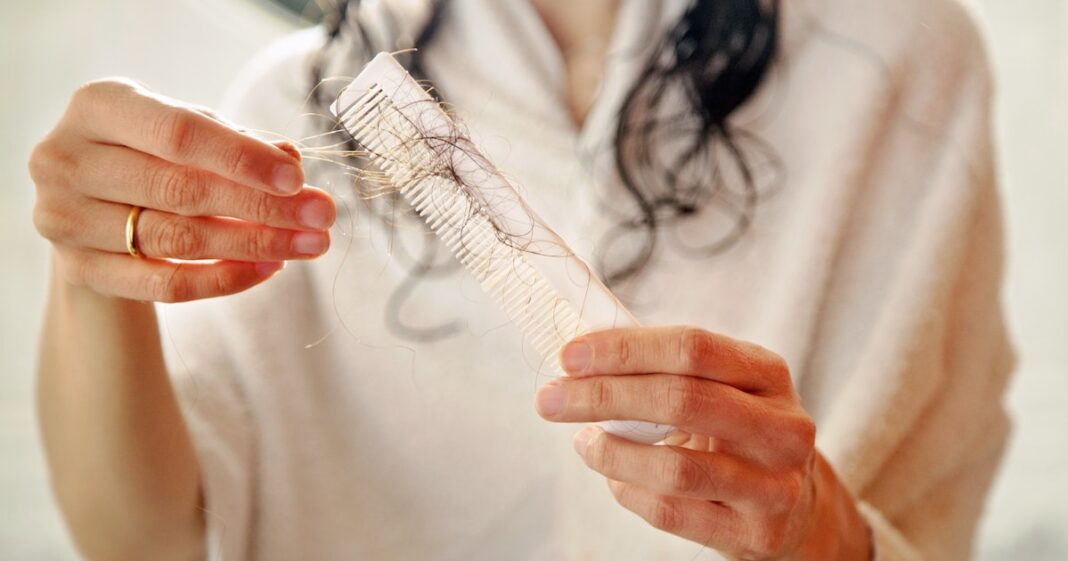If you’ve already gone through postpartum hair loss, like I did, then it can feel like a cruel twist of fate to feel like you’ve started shedding again years into motherhood. But it can happen — for many reasons — leading you to wonder, Why is my hair falling out in clumps? “Hair loss could be due to so many things,” says Ranella Hirsch, MD, a Board Certified Dermatologist in Cambridge, Massachusetts. “Stress. COVID. Hormonal imbalance or thyroid dysfunction. There’s a long list of things that can trigger more-than-usual hair loss.”
How you treat it, Dr. Hirsch says, depends on whether your hair loss is “appropriate” given whatever you are facing. “I don’t use the word ‘normal’ because hair loss is such an intensely upsetting issue,” Dr. Hirsch explains. “It isn’t a binary ‘normal versus abnormal’ thing.” That said, chemotherapy is predicted to cause hair loss, but something like financial strain usually does not make your hair fall out (though it is possible).
To get to the, uh, root of the problem, you really should see your primary care doctor or dermatologist, and possibly a therapist. But if you’re into trying to self-diagnose before you seek an expert, here are five possible causes of hair loss.
Stress
I have a friend who lost hair when she was going through a divorce. That kind of trauma — like when you lose a parent or have a very ill child or suffer some sort of an accident — can lead to stress-induced hair loss. The scientific name for it is telogen effluvium, and it’s essentially also what happens to you after you give birth: Your body goes through a shock, either physical or emotional or both, that disrupts the regular hair-growth cycle so that hairs come out all at once.
The silver lining is that this stress-induced hair loss is usually temporary and not a lifelong condition. There are steps you can take to deal with stress-induced hair loss that primarily include the basics of anxiety management: eating healthy foods and getting enough sleep, plus trying meditation, yoga, and/or therapy. You can try shampoos for hair loss. You might also consider hair extensions for this or any kind of hair loss. Then you have to wait it out, and it could be six months before new hair starts filling in.
If you don’t feel like your stress level is the cause of your hair loss, keep researching.
Illness, Including Covid and Thyroid Issues
The toll of battling an illness can also make your hair fall out. This is telogen effluvium again: Your body has been shocked, and after a period of your hair resting and not going through the usual growth-and-shed cycle, it may shed all at once.
Thyroid disorders and the resulting hormone imbalance are also well-known for causing thinning hair, and there are other subtle symptoms of thyroid dysfunction, including fatigue. Your doctor or an endocrinologist can use a blood test to check you for thyroid issues and help you get treatment.
Thinning With Age
I am so sorry to write that female pattern hair loss is a real thing. In medical terms, it is a form of androgenetic alopecia, and millions of women get it and must work to treat their thinning hair. Usually, your part gets wider. You may notice a bald patch, though rarely do women go truly bald the way men do. If you still have young kids at home, it’s less likely that you’re at the post-menopausal stage when hair loss due to age kicks in, but like with so many things, both hormones and genetics play a role.
If your thinning is due to aging, the bad news is that this type of hair loss (androgenetic alopecia) doesn’t reverse itself like the stress-induced kind (telogen effluvium). Ways to slow your hair loss include carefully choosing which products you use and what hair accessories you wear. You can also join the legion of older women who adopt chic, shorter haircuts and give up on ponytails. (I am really fighting that last one, holding on to my little ponytail like it’s my last drop of youth, but I’ll let it go eventually.)
Prescriptions
This gets trickier because what you ingest could trigger either kind of hair loss, the reversible kind or the steady kind. And you have to weigh the possible side effect of thinning hair against beating whatever medical condition you are fighting. The AARP lists eight types of drugs that could cause hair loss, including common things like some antidepressants, blood pressure meds, and prescriptions for acne. If you think your hair loss could be due to a prescription, talk to your doctor to see if there’s something else you could try instead.
Your Hair Routine
I can speak to this from experience. I have always had thin hair, and in the bleary days of early motherhood, I read that an easy way to give it more volume was to sleep with it fastened in a bun on top of my head, then shake it out in the morning. Unfortunately, after years of that, my hair was so broken that, especially at the nape of my neck, it was practically nonexistent. My stylist confronted me with a mirror and the question “what is going on back here?” Suddenly it all clicked: My nighttime routine, on auto-pilot, was destroying my hair.
Other beauty efforts that can break your hair include bleaching, perming, using high heat too often, and a host of other things, even brushing too much and, ironically, those hair extensions (use cautiously!).
None of us can get back our 15-year-old locks. But we can hold on to what hair we’ve got, as best we can.


